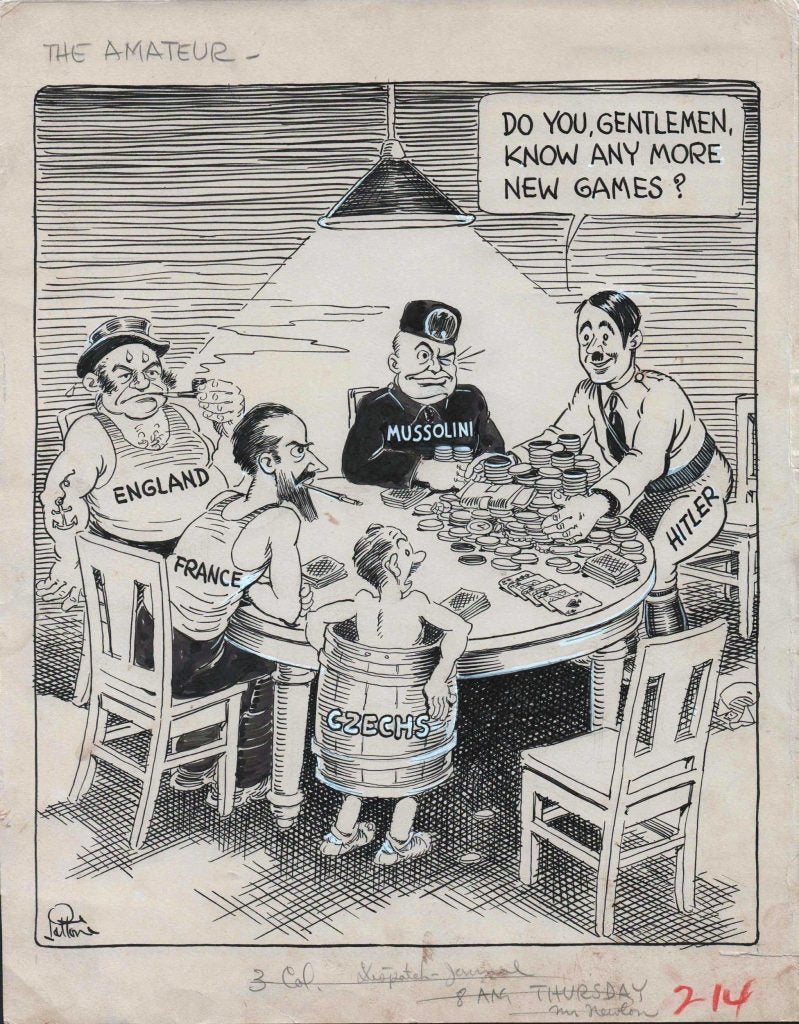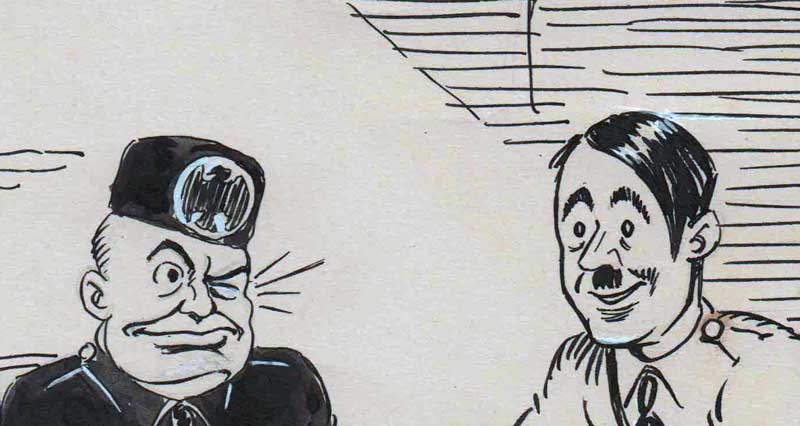
“The Amateur” (September 21, 1938)
by Jack Patton (1900-1962)
12 x 14 in., ink and crayon on board
Coppola Collection
Jack Patton was originally from Louisiana. He worked as an editorial cartoonist from the 1910s through the 1930s. In the 1930s, he was a widely read editorial cartoonist for The Dallas Morning News. His last editorial cartoons appeared at the end 1939 and perhaps through the start of 1940. During the 1930s, he also began the newspaper strip ‘Restless Age,’ which was followed by ‘Spence Easley’.
As a child, Patton read a magazine advertisement offering easy lessons in drawing. He signed up for a brief course, and it was enough to whet his appetite for a lifetime of cartooning. Scraping together enough money to get to Chicago, he enrolled in the Academy of Fine Arts. While at the school, he received word that the old Dallas Journal, then the evening publication of The Dallas News, needed an assistant in the art department. Hurrying back to his hometown, Mr. Patton found to his delight that he would work with veteran News cartoonist John Knott. The year was 1918 and two years later his editorial cartoons won a place on page 1 of the Journal. In the early part of his career, Mr. Patton was one of the first men in the business to put out both an editorial cartoon and a comic strip daily. The editorial cartoons had a stinging wit, and the originals were frequently requested by the subjects, including Franklin D. Roosevelt, Herbert Hoover and John Nance Garner.
September 12: Hitler made a speech in Nuremberg declaring that the oppression of Sudeten Germans must end. The speech was broadcast live to the United States by CBS Radio and was the first time that many Americans had ever heard Hitler speak.
September 13: French PM Edouard Daladier asked British PM Neville Chamberlain to make the best deal he could with Hitler.
September 15: Chamberlain boarded a plane for the first time in his life and flew to Germany to meet with Adolf Hitler. Chamberlain had already decided not to go to war over Czechoslovakia, so all that was left to negotiate was the means of meeting Hitler’s demands.
September 17: Chamberlain reported to the Cabinet on his meeting with Hitler, informing its members of his belief that a settlement of the Sudeten matter would satisfy Hitler’s aims.
September 18: Daladier came to London for a conference on Czechoslovakia. The German annexation of the Sudetenland was agreed upon.
September 19: The British and French representatives in Prague presented the Anglo-French proposal to allow the Sudetenland to be annexed.
September 20: The Czechoslovak government rejected the Anglo-French proposal; Hitler met with the Polish ambassador and told him that Germany would support Poland in a conflict with Czechoslovakia. Hitler also said he was considering shipping Europe’s Jews to a colony and expressed hope that Poland would cooperate with such a plan. He replied that if Hitler could solve the Jewish question, the Poles would build a monument to him in Warsaw.
September 21: The British and French ambassadors informed the Czechoslovakian President that his country would have to accept their plan or face Germany alone.
September 22: The Czechoslovakian government resigned.
September 25: The new Czechoslovakian President rejected Hitler’s latest demands as “an ultimatum given to a defeated nation, not a sovereign one.”
September 27: The French government announced that France would not enter a war purely over Czechoslovakia. Neville Chamberlain gave a radio address saying, “However much we may sympathize with a small nation confronted by a big and powerful neighbor, we cannot in all circumstances undertake to involve the whole British Empire in a war simply on her account. If we have to fight it must be on larger issues than that.”
September 29: Adolf Hitler, Neville Chamberlain, Edouard Daladier, and Benito Mussolini met in Munich to settle the Sudetenland crisis. Czechoslovakia was not invited, neither was the Soviet Union.
September 30: The Munich Agreement: At 1 AM, the four powers at Munich agreed that Czechoslovakia would cede the Sudetenland to Germany by October 10. The territorial integrity of the rest of Czechoslovakia was guaranteed by all signatories.
Neville Chamberlain flew back to Britain and declared “peace for our time.”
October 1: There is no Munich Agreement: German troops began to occupy the Sudetenland.
October 3: Nazi Germany issued the Decree on the Confiscation of Jewish Property.
October 5: All German passports held by Jews were invalidated.
October 7: The Fascist Grand Council of Italy approved the first Italian Racial Laws, banning interracial marriage and prohibiting Jews from enrolling in the Fascist Party or serving in the military.
October 28: Some 12,000 Polish Jews were deported from Germany in the vicinity of the border town of Zbaszyn. Many of the expelled Jews were denied entry into Poland on the basis of the country’s new denaturalization law. Some went back into Germany and about 5,500 wound up staying in disused stables and other temporary shelters around Zbaszyn with nowhere else to go.


